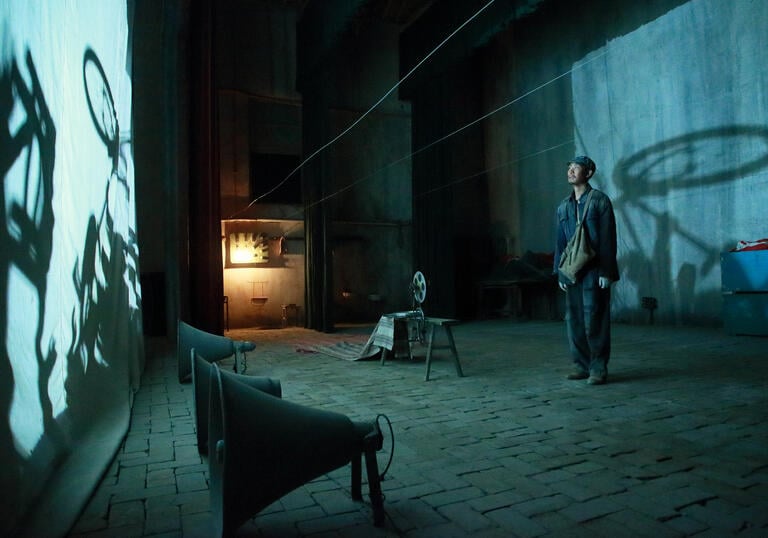One Second (12A) & Screentalk with Dr. Jie Li and Dr. Chris Berry

This film and conversation explores the Cultural Revolution's impact on China, by looking at how cinema has been used as a tool of both resistance and propaganda.
Zhang Yimou's One Second intertwines with the ideas presented in the new book Cinematic Guerrillas by Jie Li, which addresses how cinema in China has been used as a tool of both resistance and propaganda. One Second looks at the journey of a man living against the backdrop of China's political upheaval, showcasing Yimou's mastery in portraying human resilience amid historical turmoil.
This event has been organised to celebrate the 2024 Kraszna-Krausz Moving Image Book Award recipient, Cinematic Guerrillas: Propaganda, Projectionists, and Audiences in Socialist China by Jie Li (Columbia University Press).
Following the event there will be a reception in the foyer, that all audience members are welcome to join.
China, 2020, Mandarin, 105 minutes, Zhang Yimou
Organised in collaboration with the Kraszna-Krausz Foundation
This is a past event. Subscribe to our newsletters to hear about upcoming events
Booking fees
£1.50 booking fee per online/phone transaction.
No fee when tickets are booked in person.
Booking fees are per transaction and not per ticket. If your booking contains several events the highest booking fee will apply. The booking fee may be reduced on certain events. Members do not pay booking fees.
On the book
"A phenomenally well-researched, brilliantly presented thrill-ride of a book that draws on extensive field interviews as well as the archive to open up a whole new set of discussions around the notion of state propaganda..The book is a model of nuanced, rigorous scholarship. It’s as exciting a moment as I can remember in the field of film book publishing, with a plethora of groundbreaking work being made available across the board.” Kieron Corless, 2024 Moving Image Judge.
Biographies
Jie Li is Professor of East Asian Languages and Civilizations at Harvard University, her research interests center on the mediation of memories in modern China. Her first book, Shanghai Homes: Palimpsests of Private Life (Columbia, 2014), excavates a century of memories embedded in two alleyway neighborhoods destined for demolition. Her second monograph, Utopian Ruins: A Memorial Museum of the Mao Era (Duke University Press, 2020), explores contemporary cultural memories of the 1950s to the 1970s through textual, audiovisual, and material artifacts, including police files, photographs, documentary films, and museums. Li has co-edited a volume entitled Red Legacies: Cultural Afterlives of the Communist Revolution (Harvard Asia Center, 2016). Her current book project, Cinematic Guerrillas: Maoist Propaganda as a Spirit Medium explores film exhibition and reception in socialist China, including movie theatres and open-air screenings, projectionists and audiences, as well as memories of revolutionary and foreign films. Her other research projects include a transnational film history of Manchuria and a cultural history of noise in modern China.
Chris Berry is Professor of Film Studies at King’s College London. Prior to his current appointment, he taught at La Trobe University in Melbourne, The University of California, Berkeley, and Goldsmiths, University of London. Primary publications include: Cinema and the National: China on Screen; Postsocialist Cinema in Post-Mao China: the Cultural Revolution after the Cultural Revolution; Chinese Film Festivals: Sites of Translation; Routledge Handbook of East Asian Popular Culture; Public Space, Media Space; Chinese Cinema, 4 vols, The New Chinese Documentary Film Movement: For the Public Record; Electronic Elsewheres: Media, Technology, and Social Space; Cultural Studies and Cultural Industries in Northeast Asia: What a Difference a Region Makes; TV China; Chinese Films in Focus; Island on the Edge: Taiwan New Cinema and After.
See more art, music, film and theatre for less
Cinema 1
Location
Barbican Cinema 1 is located within the main Barbican building on Level -2. Head to Level G and walk towards the Lakeside Terrace where you’ll find stairs and lifts to take you down to the venue floor.
Address
Barbican Centre
Silk Street, London
EC2Y 8DS
Public transport
The Barbican is widely accessible by bus, tube, train and by foot or bicycle. Plan your journey and find more route information in ‘Your Visit’ or book your car parking space in advance.
Location
Barbican Cinema 2 & 3 are located on Beech Street, a short walk from the Barbican’s Silk Street entrance. From Silk Street, you’ll see a zebra crossing that will take you over the road to the venue.
Address
Beech Street, London
EC2Y 8DS
Nearby public transport
We are within walking distance from a number of London Underground stations, the closest being Barbican, St Paul’s and Moorgate. The nearest train stations are Liverpool Street and Farringdon. Bus Route 153 runs directly past the Barbican along Chiswell Street
Car and bicycle parking
We have free bicycle spaces and paid car parking spaces available
We’ve plenty of places for you to relax and replenish, from coffee and cake to wood-fired pizzas and full pre-theatre menus
Access
Level access from the Pit floor foyer only to the two boxes (see Mobility below). All other seats lead off stepped aisles.
Mobility
Two boxes at the rear of the auditorium each have space for one wheelchair user and a companion. Please book early and ask for these seats.
Assistance dogs
Assistance dogs may be taken into the cinema – please tell us when booking, to ensure your seat has enough space. If you prefer, you may leave your dog with a member of the foyer staff during the performance.
Hearing facility
There is an induction loop in the auditorium. You can use this by adjusting your hearing aid to the ‘T’ setting.
For more access information, please visit our Accessibility section.
Access
Cinemas 2 & 3 are located at Beech Street, a short walk from the Barbican Centre’s main Silk Street entrance. There are a couple of steep, dropped kerbs and an incline to negotiate between the two sites. Level access from Beech Street.
Mobility
Each auditorium has three permanent wheelchair spaces (two in the third row and one in the front row) and 153 fixed seats with capacity for a further three spaces in the front row. Access to each auditorium is up a ramp. There are also a number of seats with step-free access.
Assistance dogs
Assistance dogs may be taken into the cinema – please tell us when booking to ensure your seat has enough space. If you prefer, you may leave your dog with a member of the foyer staff during the performance.
Hearing facility
An infrared system for hard of hearing customers is provided in each auditorium; headsets or neck loops can be collected from foyer staff. The ticket desk counter is fitted with an induction loop.
For more access information, please visit our Accessibility section.





